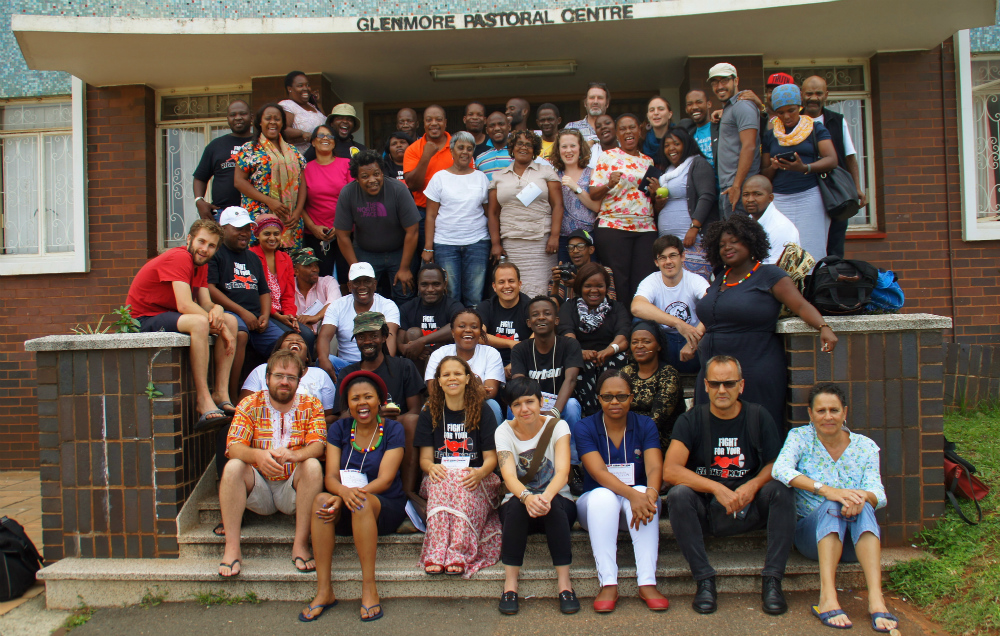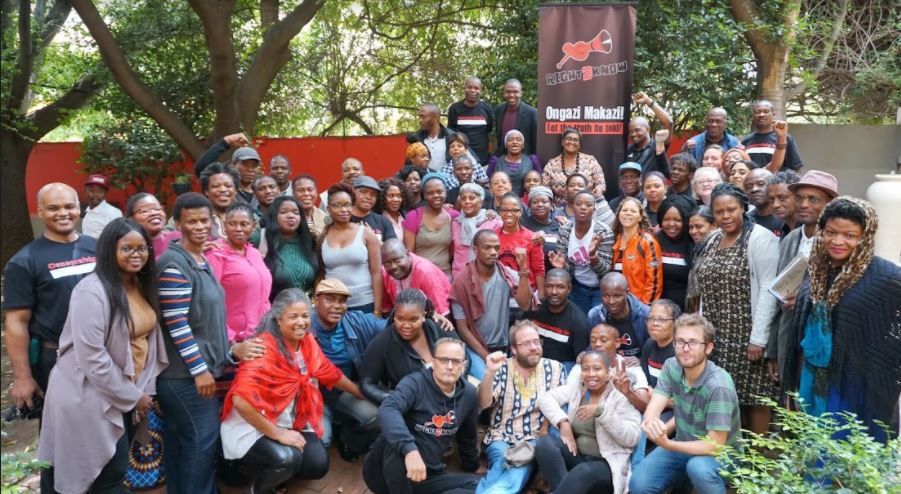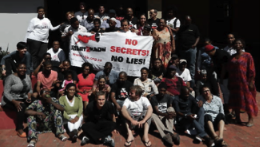R2K Founding Summit Resolutions
Right2Know held our founding National Summit from 2 – 3 February 2011. Download the full report here.
-
1. Introduction
The Right2Know Campaign held its’ first National Summit1 in Athlone, Cape Town from 2- 3 February 2011. The Summit was constituted by 60 delegates2 elected at Provincial Summits in Gauteng, Kwazulu Natal, and the Western Cape.
The first National Summit formally constituted the Right2Know Campaign that has been driven on an ad-hoc basis by volunteers in Provincial Working Groups since it’s launch in October 2010. The Summit has provided the Right2Know Campaign with a clear strategic orientation, common principles, key elements of an operational plan for the coming year, and an elected leadership to take the Campaign forward.
The free flow of information is critical to the advance of participatory democracy and meeting the needs of South Africans. On the back of months of rapid growth, the Right2Know Campaign has now democratically established a strong foundation to defend and advance the right of everyone living in South Africa to access information.
-
2. Mission & Vision Statements
The Summit workshopped and adopted the following vision and mission statements for the campaign:
Our vision:
“We seek a country and a world where we all have the right to know – that is to be free to access and to share information. This right is fundamental to any democracy that is open, accountable, participatory and responsive; able to deliver the social, economic and environmental justice we need. On this foundation a society and an international community can be built in which we all live free from want, in equality and in dignity.”
Our Mission:
- To co-ordinate, unify, organise and activate those who share our principles to defend and advance the right to know.
- To struggle both for the widest possible recognition in law and policy of the right to know and for its implementation and practice in daily life.
- To root the struggle for the right to know in the struggles of communities demanding political, social, economic and environmental justice.
- To propagate our vision throughout society.
- To engage those with political and economic power where necessary.
- To act in concert and solidarity with like-minded people and organisations locally and internationally.
-
3. Campaign Principles
The Summit workshopped and adopted the following principles for the Campaign:
To be added
-
4. Campaign Focus
The Summit agreed that while the Right2Know Campaign was launched in response to the the Protection of Information Bill (the Secrecy Bill) currently before Parliament, the Bill was itself systematic of a broader threat to the free flow of information in South Africa.
The Summit resolved that:
- The Campaign should broaden its’ focus form the Secrecy Bill to include other aspects on access to information as well as defending and enhancing the dissemination of information – media freedom and diversity;
- The Secrecy Bill remained the most immediate threat to the free flow of information and should remain the primary focus of the Campaign;
- The campaign should engage issues of access to information to highlight the existing culture of secrecy in South Africa and illustrate the impact of secrecy on the lives of ordinary people;
Three commissions sat to deepen potions and strategies of the campaign in regard to these three areas of focus.
-
4.1 Protection of Information Bill
The Summit reaffirmed Right2Know’s commitment to the analysis and demands contained in the Campaign’s first statement: Stop the Secrecy Bill! Let the Truth Be Told! (See Appendix 4).
After assessing the progress of the Parliamentary Committee dealing with the Bill, delegates agreed that legislation was required to replace old Apartheid laws still governed the classification of information.
The Summit resolved that:
- Any legislation passed must meet the Right2Know Freedom Test (the demands in the first statement).
- The Campaign should use of multi-faceted tactical means to continue to engage the government (both inside and outside) but based on our principles.Tactically, the Campaign should call for the scrapping of the Bill and a call for re-writing of the legislation governing the classification of information.
- Any process of developing new legislation should include public participation and ensure that communities are engaged in this process;
- The Campaign should not come up with alternative Bill and risk being complicit in drafting secrecy legislation. Rather we should make points based on our principles around what should be drafted.
- The Campaign should undertake education of ordinary people in relation to the call to scrap the Bill. The Secrecy Bill and old Apartheid Act should be made available to people. This popular education needs to unpack what is being scrapped and why we are making this call.
-
4.2 Access to Information
The Summit resolved that:
- The Campaign should promote the access public and private sector information, including commercial information;
- The Campaign should presume government for full disclosure of information;
- The Campaign should be used as a mechanism for demanding that the onus be shifted to government and private companies to proactively make info available. This needs to be reclaimed as a political, not legal issue.
- Information should be provided in a simplified and accessible format;
- The Campaign should support the mobilisation of communities around specific demands to access information. This should include the support of key PAIA requests for masses of info for whole communities;
- The Campaign should conduct an audit of participating organizations and what they do and circulate that list so that everyone knows the expertise in the group.
- The Campaign should share experiences of using PAIA including the costs of using PAIA (litigation, cost of copies) and attempts to get access to third party information;
- The Campaign should engage in the review of PAIA already underway;
- The media should give sufficient priory to investigating and reporting on issues that impact on poor and working class communities;
- Consumer information should be published on products, in particular colour-coding system for foodstuff containing genetically modified organisms (GMOs);
Note sure what is meant by the following points:
- Consumer Protection Act
- Brings individuals to the same level as officials
- Access to personal information – media perspective
- POI Bill – creation of info commission. Current proposal that commission also take on enforcement of access to information. But also need to strengthen political fight for information.
- Platform for strategies for requesting
- Need to link rural and urban area- land issue
-
4.3 Media Freedom & Diversity
The Summit noted that:
- There’s a high concentration of media ownership with 90% of South African media controlled by 5 (4 commercial and 1 public). This impacts negatively on diversity and the free flow of information;
- Mainstream media represents the interests of a small and elite ideological base;
- SA has been at the forefront of launching community radio. However, this sector remains weak and under-resourced and dependent on market forces for sustainability, which erodes community ownership and control;
- The role of ICASA has been unable to perform its key function of monitoring compliance and its regulatory functions, especially in relation to the SABC;
- The ruling party’s proposed Media Appeals Tribunal (MAT) poses a significant threat to media freedom and independence. However, there is a increasing trend amongst the print media for sensationalist reportage that lacks in critical depth and adopts citizens’ agenda, and a lack of community and minority (women and children etc.) representation;
- There is tremendous development and democratic potential in social media as portals for exercising peoples’ rights.
- Believing that:
- Freedom of expression is a foundational Human Right and media freedom is an integral component of freedom of expression;
- The media is a public good and should not be commodified for purely profit-driven purposes;
- A strong and independent regulator is critical for an independent broadcast media that functions free from government and commercial interference;
- There needs to be diversity of ownership (private, government and community) that each have the responsibility exercise a high standard of journalistic ethics, including accuracy;
- The media should offer diverse content and include the voices of poor and working class people;
- Therefor the Summit resolved:
- To campaign to strengthen ICASA to ensure that it functions and regulates courageously in the interest of the public, and not government and commercial interests;
- Campaign for the adequate and sustainable funding of community media. Community media should not be overly reliant on market sources of funding;
- Campaign for the adequate funding of the MDDA and to ensure that it is independent, more effective, and that it is more transparent and accountable in its processes, so that it fulfils its mandate of growing and diversifying the media;
- Ensure that community stations are democratically owned and controlled by the community, and to support communities in claiming their ownership and participation in their stations,
- Explore possible anti-trust measures to limit the concentration of media ownership;
- Reject the Media Appeals Tribunal or any statutory regulation that impacts on editorial freedom in the print sector;
- Campaign for redressing infrastructural impediments to the exchange of information including accessible and affordable broadband for internet access;
- Engage in the policy review process on the far reaching Public Service Broadcast Bill that is to be conducted by the Department of Communications to ensure that these resolutions and principles are applied and upheld in any legislation.
-
5. Building the Right2Know Campaign
The final set of three commissions at the Summit considered how best to build and coordinate the Campaign.
-
5.1 Coordinating the Campaign
The Summit resolved that:
- The Campaign should continue to be inclusive and engage our broad base of supporters;
- Accountability to our supports should be maintained through regular communication and annual Provincial Summits open to all supporters. Participants at Provincial Summits should elect Provincial Working Group and a delegation to an annual National Summit. Delegates at the National Summit should elect a National Working Group.
- Provincial Working Groups should coordinate provincial aspects of the Campaign and release statements on provincial matters;
- The National Working Groups should coordinate national aspects of the Campaign, release statements on national matters, and engage international allies/networks;
- All working Groups may co-opt additional members as they see fit;
- All Working Groups may constitute ad-hoc and standing sub committees as they see fit;
- All Working Groups should circulate minutes of every meeting to all Working Groups;
- The Campaign should register as a non-profit organisation with it’s own legal status before the next National Summit;
- The Campaign should consider employing a national Media Officer;
- All Campaign finances should be controlled through a single bank account;
- Annual financial statements must be audited by an external auditor and published on the campaign website;
- All fund-raising efforts undertaken nationally, provincially, or by members on behalf of the campaign must be coordinated Nationally so as not to send confusing messages to donors;
- Funds raised by the provinces will be used by those province
- Provincial Working Groups should receive a budget for ongoing coordination, popular education and mobilisation work.
NOT SURE WHAT IS MEANT BY THESE POINTS:
Accountability mechanisms – should be able to recall members.
National membership not part of groups – responsibility of the national group
-
5.2 Popular Education & Mobalisation
The Right2Know Campaign must be roots in communities and popular struggles. Popular education and mobalisation are essential to ensuring the success of the Campaign.
The Summit Resolved that:
- The Campaign should link to strategies of supporting organisations, promoting the use of access to information as a tool to achieve socio-economic rights and link the demands of the Right2Know to other struggles;
- The Campaign should conduct a scan of civil society identifying areas where organizations are effectively campaigning on the ground;
- The Campaign should work with all sectors of civil society including trade unions (currently under represented in the Campaign);
- The Campaign should highlight the current culture f secrecy in South African by presenting a list of demands for access to information from supporters struggles as the Right2Know Top 10 Secrets List and campaign to ensure access to this information;
- The Campaign should support whistle-blowers in practical ways including the establishment of a Support Fund;
- The Campaign should engage the youth targeting schools and universities;
- The Campaign should build alliances with the media paying special attention to community media;
- The Campaign should engage with artists, poets, and drama students at universities;
- The Campaign should explain the Secrecy Bill to communities in simple terms illustrating the impact it will have on ordinary people
- The Campaign should use all methods of education, including pamphlets, posters, social networking services, mxit, banners, billboards, newspaper articles and radio – not necessarily workshops alone;
- The Campaign should develop a core group of activists by conducting Cadreship Schools that prioritise the development of cadres within the next 3 months. The Schools should build a team of expertise, than can facilitate popular education on the ground;
- The curriculum of the Cadreship Schools should explain what information is, the importance of access to the information, the Bill of Rights/Constitution, democratic participation, Promotion of Access to information Act (PAIA), the importance of whistle blowing, case studies, the threat posed by the Secrecy Bill, and the 7 principles of the Right2Know Freedom Test,
- A task team should be constituted to develop the curriculum and each province should adapt and use the Curriculum
- The Campaign should produce an action booklet;
- The Campaign should ensure a presence at local government elections to raise the awareness of the importance of information in local government.
- The should plan an action for the voter registration, target the opening of parliament, state of the nation address, and the provinces address.
-
5.3 Communicating the Right2Know
The Summit resolved that:
- The Campaign should continue to undertake eye-catching and legal actions that bring attention to intentional and local media;
- The Campaign should build a media team including a diversity of spokespeople to implement this resolution;
- The Campaign should develop partnerships and alliances with major media houses and be careful not to alienate the media in pursuit of media diversity;
- The Campaign should work with students to undertake research into our audience and media use;
- The Campaign should maintain and grow the database of supporters, become producers of media content, and pro-actively communicate with its’ supporters though newsletters, SMS and social media;
- The Campaign should produce a 2012 yearbook or calendar paying tribute to whistle-blowers;
- The Campaign should explore ‘celebrity’ endorsement but never pay for any endorsements;
- The Campaign should explore advertising on social media;
- The Campaign should develop a popularise a Campaign song;
- The campaign should communicate to media that POIB is not “anti Media Bill”, but Bill that will impact on everyone.
-
6. Elected Leadership
Delegates to the Right2Know National Summit elected the following people to form the National Working Group and implement the resolutions of the Summit:
- Alison Tilley, Open Democracy Advice Centre
- Ashley Louw, Delft Integrated Network
- Dale McKinley, Anti-Privatization Forum
- Glenda Daniels, M&G Centre for Investigative Journalism (amaBhungane)
- Hennie van Vuuren, Institute for Security Studies
- Jayshree Pather, Freedom of Expression Institute
- Mark Weinberg, Alternative Information Development Centre
- Nkwame Cedile, R2K Western Cape
- Quinton Kippen, Democracy Development Programme
- Siphiwe Segodi, Freedom of Expression Institute
- Sithembile Mbete, Institute for Democracy in Africa
- Zodwa Nsibande, Abahlali BaseMjondolo
-
7. Conclusion
The Right2Know Campaign has entered a new phase in its fight against secrecy. Just five months after the Campaign’s its launch, the first National Summit was held in the first week of February in Cape Town, where 62 campaign leaders from structures across the country converged gathered to plan a campaign strategy and to chart the way forward. The Right2Know campaign has emerged from the summit with an elected leadership, a renewed energy and a clear mission to defend and advance our freedoms.
The summit, which took place in Athlone, Cape Town, was an opportunity to reflect on the remarkable growth and success of the campaign, but also to take stock of the existing threats to transparency and the free flow of information in South Africa – first and foremost the Protection of Information Bill (the Secrecy Bill) before Parliament.
- We aim to defeat the Secrecy Bill so that all South Africans are assured of their right to know.
- We agreed to expand the scope of the campaign to take on access to information fights beyond the threat of the Secrecy Bill. In the coming months the Right2Know will join other organisations and communities in fighting for information that is vital to their struggles.
- Our delegates adopted a mission and vision statement and a set of guiding principles that highlight the existing culture of secrecy in South Africa.
- Our delegates elected a national committee to drive this fight forward, made up of representatives from key civil society organisations, community groups and social movements from across our provincial support bases. The Right2Know campaign began as a very broad coalition of groups and individuals united against secrecy, and this is not set to change.
The formation of the right2Know Campaign should serve as a reminder to the ruling bloc that the people of South Africa will not accept laws or practices that undermines our daily struggles for freedom, justice and dignity. We will continue to fight to a society that is open, accountable, participatory and responsive – in other words, a society where everyone has the right to know.
### ENDS ###




